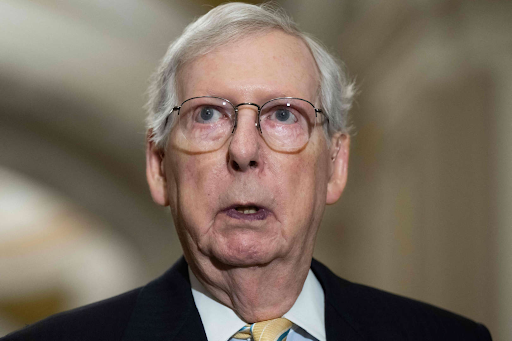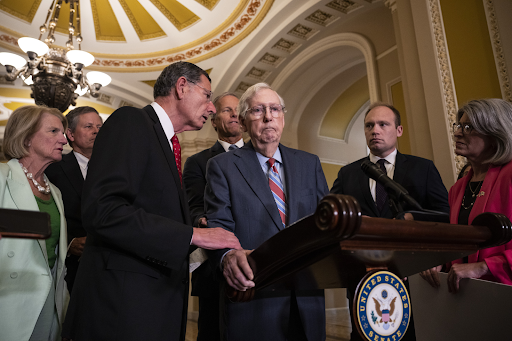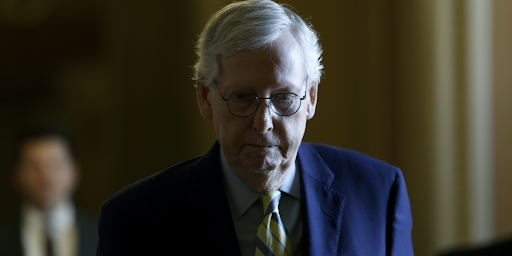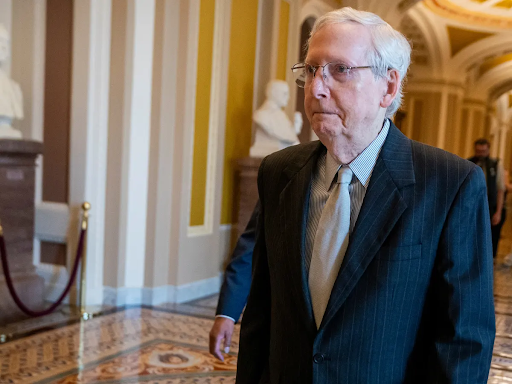
Amidst a backdrop of growing concern and political pressure, Senate Minority Leader Mitch McConnell is finding himself at a critical juncture as demands for his resignation intensify. A recent survey, conducted exclusively for Newsweek by Redfield & Wilton Strategies, has revealed that a substantial 64 percent of eligible American voters believe it’s time for McConnell to step aside from his leadership role. This sentiment is cutting across party lines, marking a significant moment in American politics.
The survey, which polled 1,500 eligible voters across the United States on August 5 and 6, 2023, is sending clear signals about McConnell’s waning popularity. Of those polled, 39 percent expressed strong agreement with the notion of his resignation, while an additional 25 percent agreed. On the opposing side, a mere eight percent indicated opposition, with five percent disagreeing and an even smaller three percent strongly disagreeing. The remaining respondents were divided, with 21 percent choosing the middle ground of “neither agree nor disagree” and seven percent opting for “don’t know.”
These calls for McConnell’s departure from his position reverberate widely among those who cast their votes for both Joe Biden and Donald Trump in the 2020 presidential election. Among the supporters of former President Trump, a resounding 71 percent are in favour of McConnell’s resignation, while a meagre six percent advocate for his continued leadership. For Biden voters, the figures are slightly more balanced, with 64 percent favouring McConnell’s resignation and nine percent advocating for his retention.

The debate surrounding McConnell’s fitness for office due to his age has also taken centre stage. The survey revealed that 42 percent of voters are “very concerned” about McConnell’s ability to fulfil his duties given his age, while an additional 23 percent are “fairly concerned.” On the less concerned end of the spectrum, 18 percent expressed slight concern, with only nine percent dismissing any concerns entirely.
McConnell’s health has been a topic of increased scrutiny, especially following an incident on July 26. During a weekly press conference, the 81-year-old Republican experienced a moment of speechlessness and immobility. Although he was led away by colleagues, McConnell quickly returned to assure reporters that he was in good health. This incident, coupled with his hospitalisation in March after a fall in a Washington D.C. hotel, has led to speculation about his physical fitness for the demands of his role.
Furthermore, the tumultuous relationship between McConnell and former President Trump has further complicated matters. Trump labelled McConnell a “disaster” soon after the latter’s release from the hospital in April. Such tensions add to the complex dynamics surrounding McConnell’s potential departure from his leadership position.

As the pressure mounts, McConnell’s public appearances have also been met with vocal dissent. On August 5, during an event in Kentucky, he was heckled with chants of “retire.” The incident was captured on video and swiftly spread across social media platforms, garnering over 8.3 million views.
Should McConnell decide to heed the calls for his resignation, potential successors are already being considered. Michael Zona, formerly GOP Senator Chuck Grassley’s communications director and head of the Bullpen Strategy Group consultancy, suggests that Senate Minority Whip John Thune, former Republican Whip John Cornyn, and John Barrasso, the chair of the Senate Republican Conference, are among the leading contenders.

Amidst similar health-related concerns, Democratic Senator Dianne Feinstein, aged 90, is also facing calls to retire. Although she was briefly hospitalised following a fall, her spokesperson assured that all scans were clear. The potential repercussions of her retirement, including the impact on the balance of power within the Senate Judiciary Committee and the Democrats’ majority status, are already generating speculation.
As the pressure on McConnell continues to mount, his decision could significantly shape the future landscape of American politics. The echoes of these calls for resignation may reverberate far beyond McConnell’s own legacy, influencing the trajectories of both the Republican and Democratic parties.





